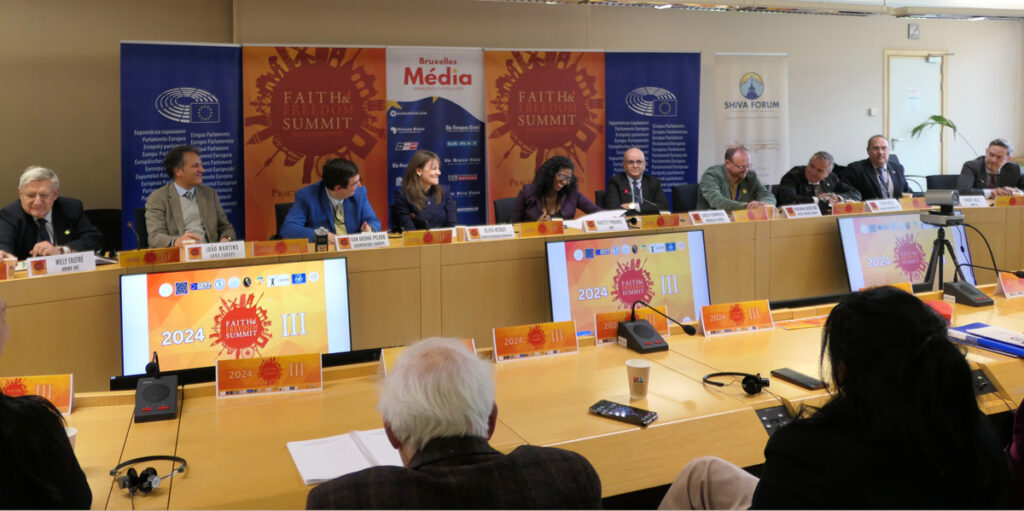The Faith and Freedom Summit III NGO coalition, concluded its conferences showing the impact and challenges of Faith-Based Organizations on serving the European community
In a welcoming and promising environment, within the walls of the European Parliament, a meeting was held last April 18th where nearly 40 participants with dignitaries from various religious movements, journalists, politicians and activists actively present on the social scene, were present.
The conference, the third one in a series that will number four in Panama next September, was organized by the Faith and Freedom Summit NGO coalition, and was hosted at the European Parliament by French MEP Maxette Pirbakas, who in addition to welcoming the participants, emphasized the attention that the European Parliament is giving to the role of religion in society, even if it has often been manipulated for speculative purposes.
The summit aimed to explore the social action of Faith-Based Organizations (FBOs) within Europe and their crucial role in building a more resilient society. After all, FBO’s play a significant role in addressing societal challenges, promoting social cohesion, and advocating for the values of faith and freedom in the European Union (EU). The participants had the opportunity to use it as a platform to discuss the challenges they have, but also the opportunities and impact needed to make a more inclusive and sustainable society inside the old continent.
They gave interesting and educational speeches in which the words “making of this one a better world” and “practicing what we preach” echoed through the room several times, and willpower was a common denominator to the point that new alliances began to be defined on a lively and collaborative scene.
The event included Catholics, Hinduists from the Shiva tradition, Christian Adventists, Muslims, Scientologists, Sikhs, Free Mason, etc, and nearly a dozen of speakers of top level within the different religions and thought movements.
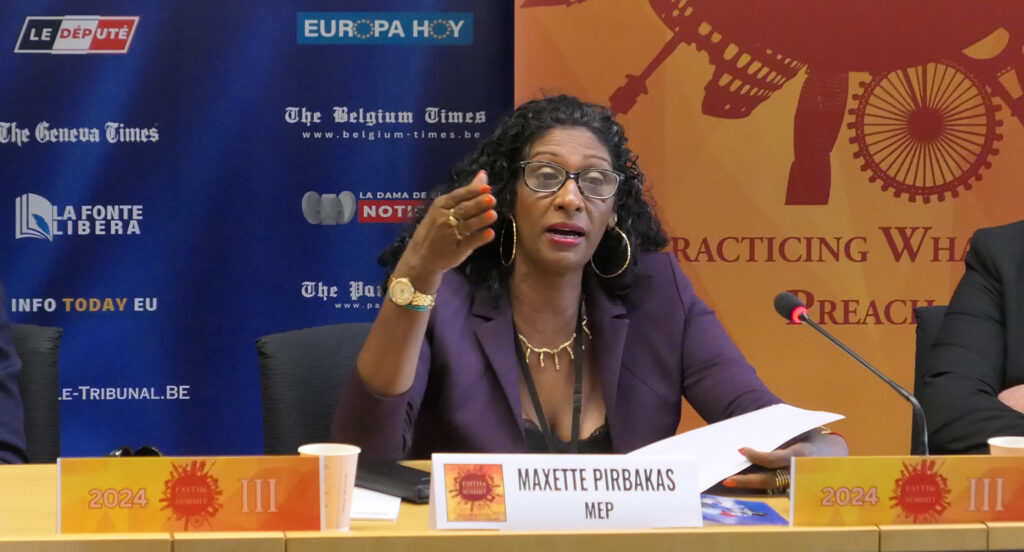
During her inaugural speech, French MEP Maxette Pirbakas aimed to promote dialogue and understanding around religious freedom in the EU. She called for finding a “middle way” between the French model of secularism and the Anglo-Saxon approach, affirming individual identities. After the introductory and thought-provoking presentation by MEP Pirbakas, the wheel of the conference was taken by Ivan Arjona-Pelado, Scientology’s representative to the EU, OSCE and UN, who became the moderator of the session, swiftly bridging from one speaker to the next ensuring the timings would allow further discussion at the end.
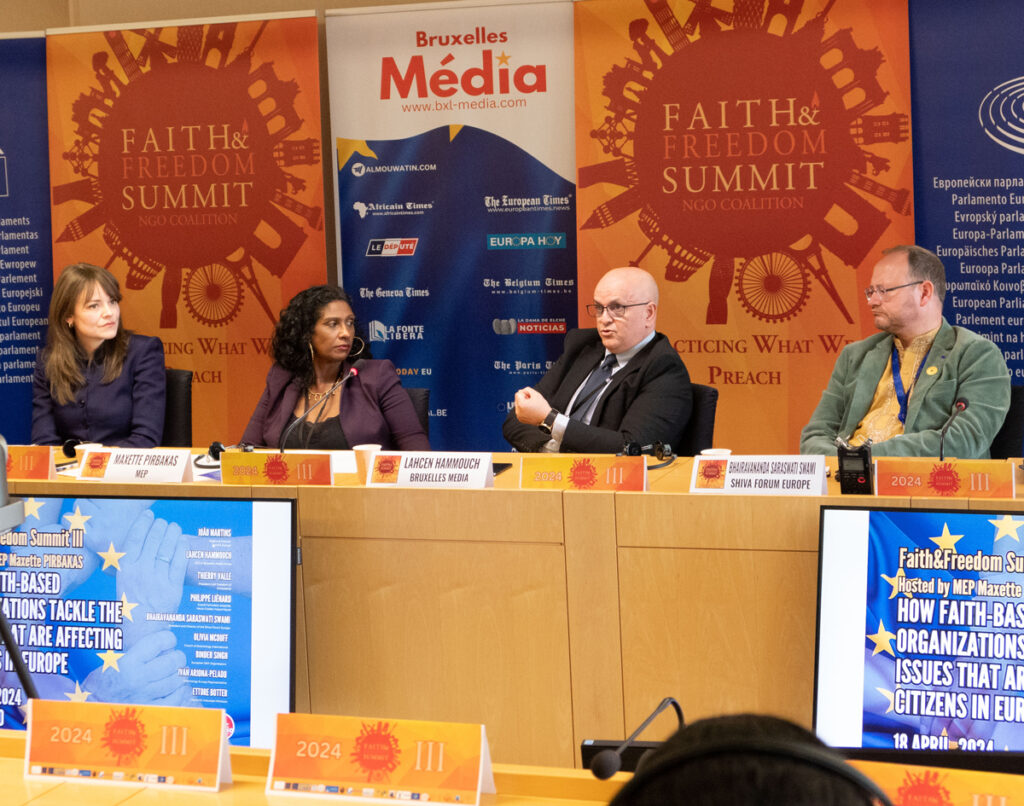
MEP Pirbakas was followed by Lahcen Hammouch, co-organizer and CEO of the Bruxelles Media Group. In a moving speech, community advocate and champion of dialogue and connecting people, Hammouch stressed the importance of unity, in a divided world, by emphasizing the concept of ‘living together.’ He encouraged individuals to move past biases and negative judgments towards fostering interactions and respectful disagreements. With a background in promoting peace, Hammouch committed himself to bridging gaps between people from diverse backgrounds and amplifying the voices of those marginalized. He criticized barriers set by countries like France on religious minorities, and called for mutual acknowledgment and integration without prejudice. Hammouch’s plea, for dialogue, shared values, and collective efforts to uphold coexistence struck a chord with many, underscoring everyone’s role in progressing towards a more inclusive and accepting global community.
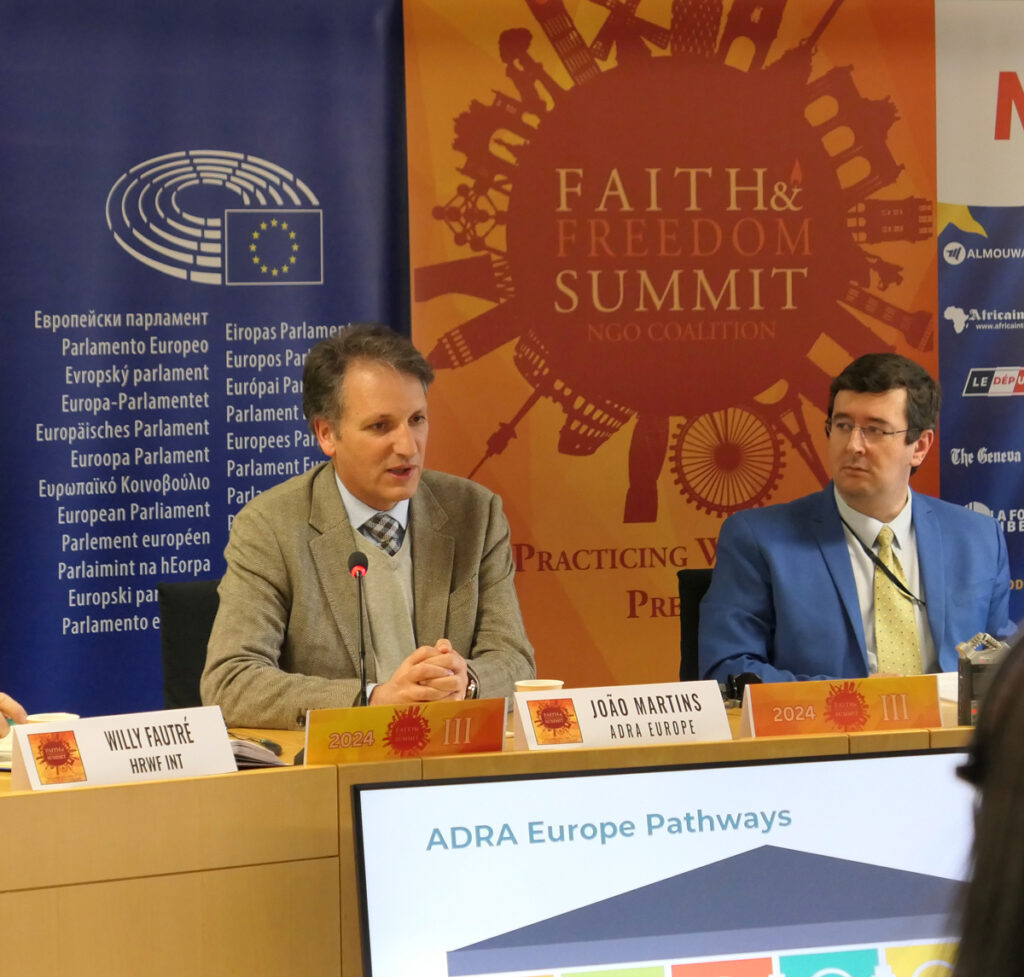
Arjona then gave the floor to Joao Martins, Europe’s Regional Director for ADRA (Adventists Development and Relief Agency). Martins, in discussing ADRA’s mission across Europe, emphasized the role of faith in driving their pursuit of justice. ADRA, a prominent faith-based NGO rooted “in Christian values of compassion and courage, employs a unique theological approach that integrates faith with proactive engagement in addressing societal injustices through church partnerships”. The NGO actively mobilizes church volunteers in disaster relief, refugee support, and community initiatives, transforming churches into shelters during crises and advocating for causes like education access. Martins highlighted ADRA’s enduring commitment to biblical principles of justice, compassion, and love, showcasing how religious convictions can empower advocacy for the vulnerable and human rights over the course of decades, while calling for cooperation with other faiths.
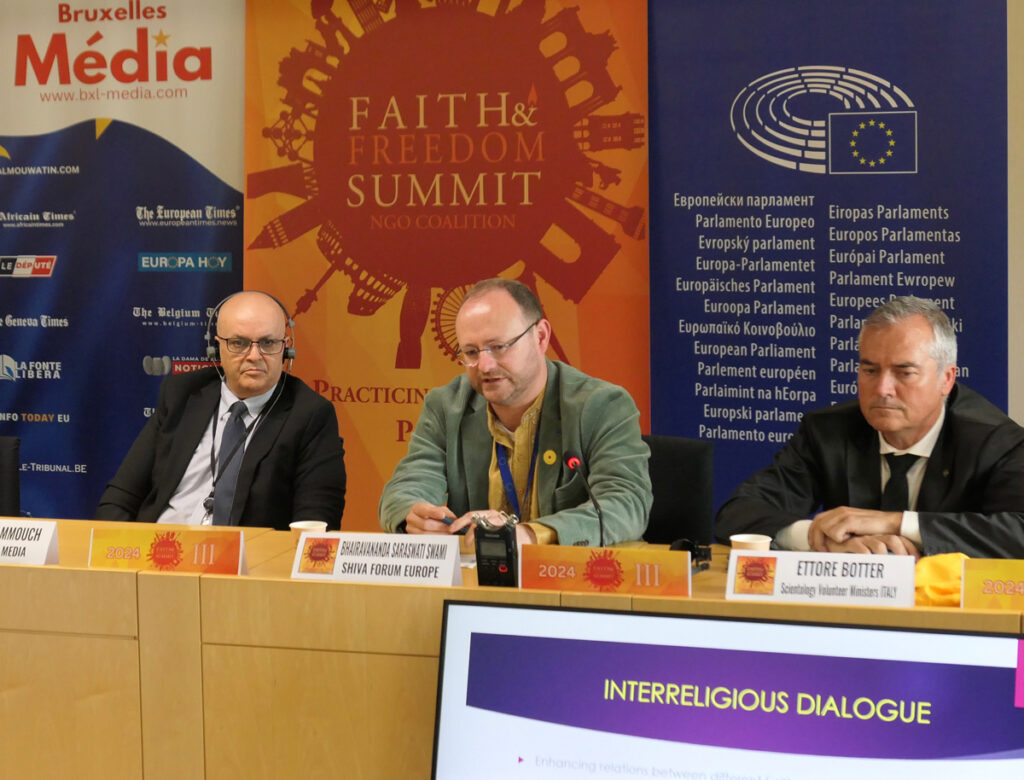
Moving from Christianity to Hinduism, Arjona bridged then to Bhairavananda Saraswati Swami, President and Director of Shiva Forum Europe. The Swami, a Hindu spiritual leader from Oudenaarde, Belgium, emphasized interfaith unity, youth empowerment, and gender equality in his speech, drawing comparisons between Hindu beliefs and Scientology practices. Known as Bhairav Ananda, he highlighted Shiva’s teachings on introspection and spiritual growth, advocating for personal development and collaboration across faiths during crises. Embracing joint male-female energy and inspired by other faith’s initiatives, he stated wanting to establish an inclusive community, offer meditation workshops, and promote human rights.
It was then the turn of Olivia McDuff, a representative, from the Church of Scientology International (CSI), who discussed the work carried out by faith based organizations and emphasized the importance of religious unity. McDuff, who oversees programs for Scientology, highlighted the unnoticed volunteer and charitable activities undertaken by religious groups globally, calling for an increased focus on these efforts. She showcased various initiatives led by Scientologists, such as drug prevention programs, educational campaigns, disaster response operations and moral values education programs that involve collaboration between Scientologists and non-Scientologists.
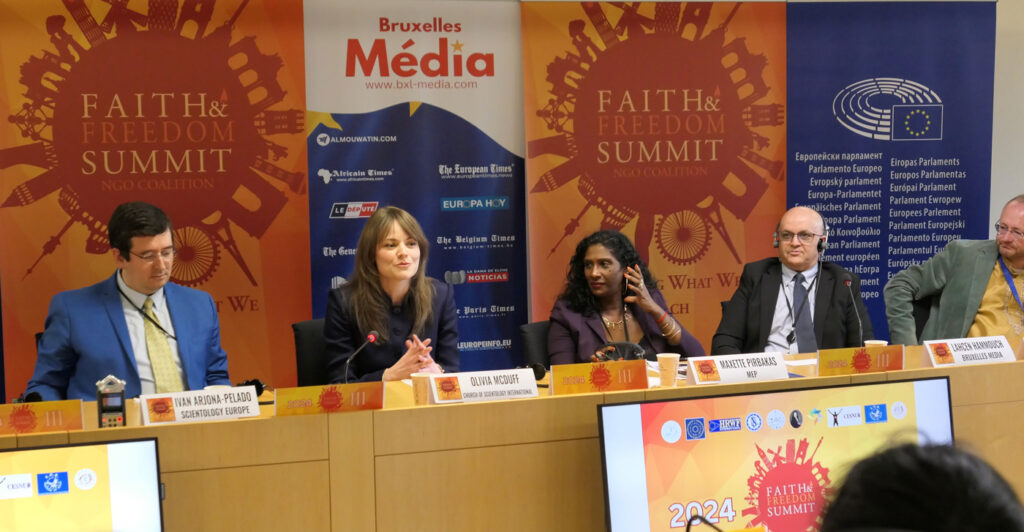
In quoting Scientology founder L. Ron Hubbard, McDuff stressed the role of religion in society and advocated for supporting other faiths to make a positive impact on the world. She concluded encouraging collaboration among faiths and highlighted Scientology’s commitment, to working together for collective advancement and joint humanitarian projects.
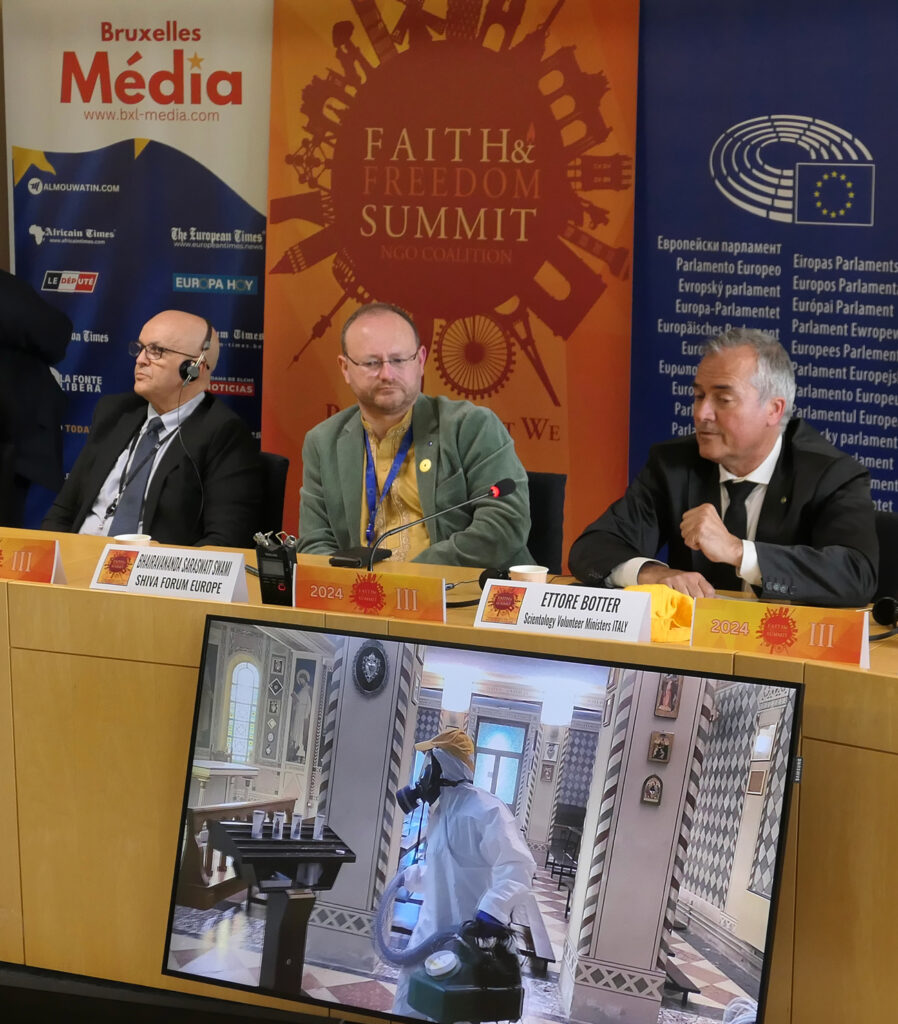
Arjona then gave the floor to Ettore Botter, representing the Scientology Volunteer Ministers of Italy, who showed a video of rapid response and impactful relief efforts of the Volunteer Ministers in times of natural disasters. Botter emphasized the core mission of service at the heart of the Volunteer Ministers’ work, highlighting their dedicated efforts in providing essential assistance following earthquakes, floods, and other crises across Europe and beyond. Through powerful visuals and firsthand accounts, Botter detailed the Volunteer Ministers’ hands-on approach, from aiding overlooked villages in Croatia to supporting flood-affected communities in Italy and delivering humanitarian relief in Ukraine. The bright yellow shirts of the Volunteer Ministers “have become a symbol of hope and hard work”, embodying their commitment to serving communities in need.
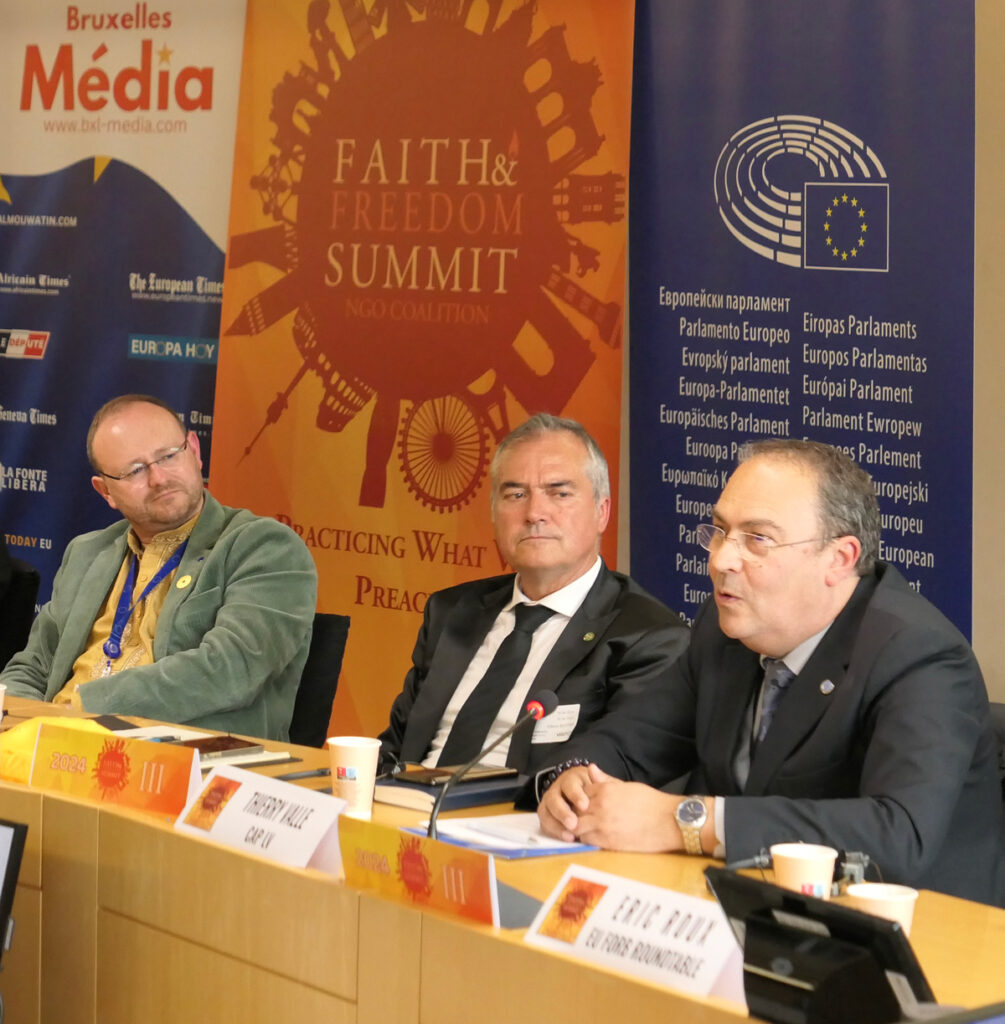
Thierry Valle, President of the NGO CAP Freedom of Conscience, was next and enlightened the participants tracing the historical impact of faith-based organizations and religious minorities on European society. Valle highlighted the pivotal roles played by these groups from the Renaissance to the present day, emphasizing their contributions to peace, social equality, and individual rights. From the Catholic Church’s diplomatic efforts during the Renaissance to the Quakers’ advocacy for peace and justice in the 17th century, Valle illustrated how religious movements have championed human rights and social justice causes. He also noted the influence of newer religious movements in the 20th century, such as Evangelical Churches and the Church of Jesus Christ of the Later Day Saints, in shaping societal discourse and advocating for global issues like environmental stewardship and poverty alleviation. Valle’s speech underscored the enduring power of faith in promoting peace, justice, and social progress, highlighting the ongoing relevance of faith-based organizations in addressing contemporary challenges and shaping a more inclusive and compassionate future for Europe.
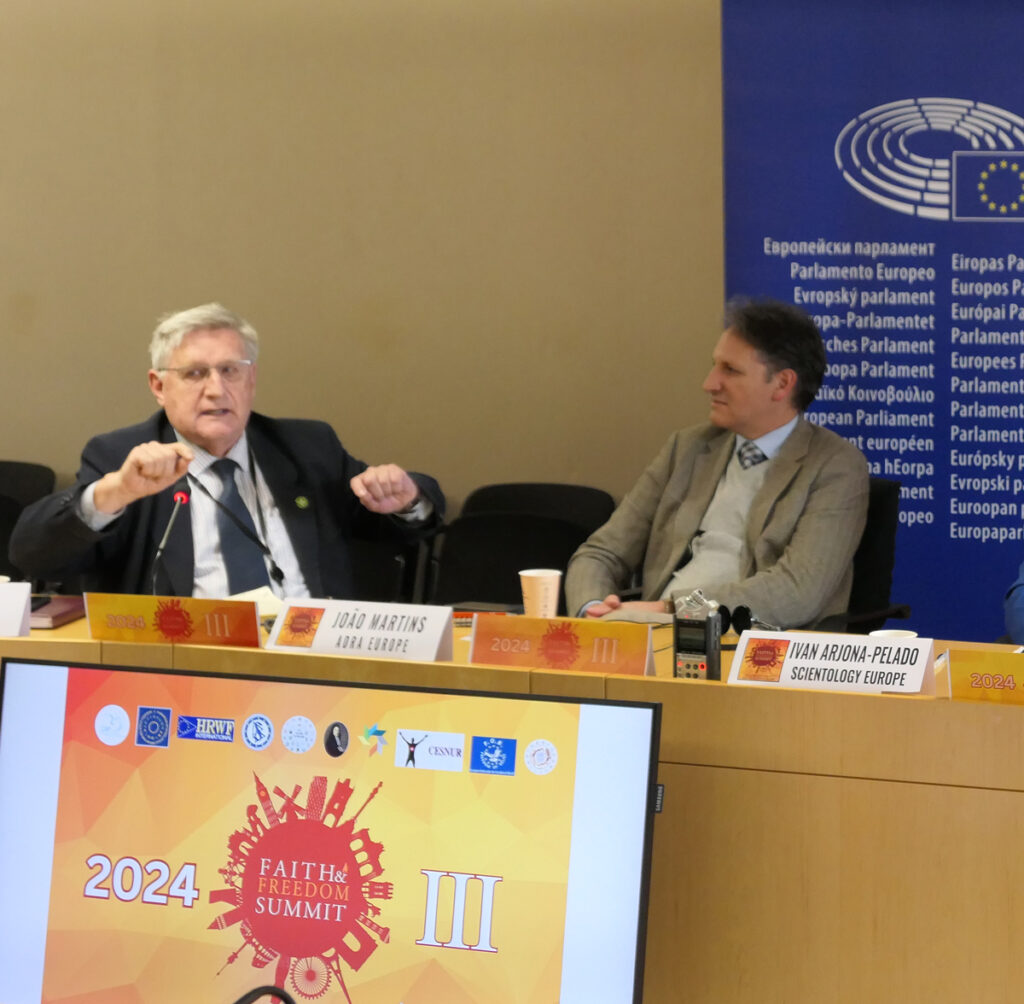
Willy Fautre, Founder of Human Rights Without Frontiers, introduced by Arjona-Pelado into the discussion, brought a unique perspective to the conference, focusing on the challenges faced by religious organizations when their humanitarian efforts are viewed as a guise for proselytizing or disrupting the status quo in certain regions. Fautre delved into the complexities religious groups encounter when conducting charitable work under the banner of a religious entity. He highlighted instances where humanitarian aid by religious groups was misconstrued as covert conversion tactics, leading to hostility and segregation. Fautre called for a nuanced discussion on granting religious organizations the freedom to carry out charitable activities without unwarranted suspicion or prejudice, emphasizing the importance of safeguarding religious expression in the public sphere.
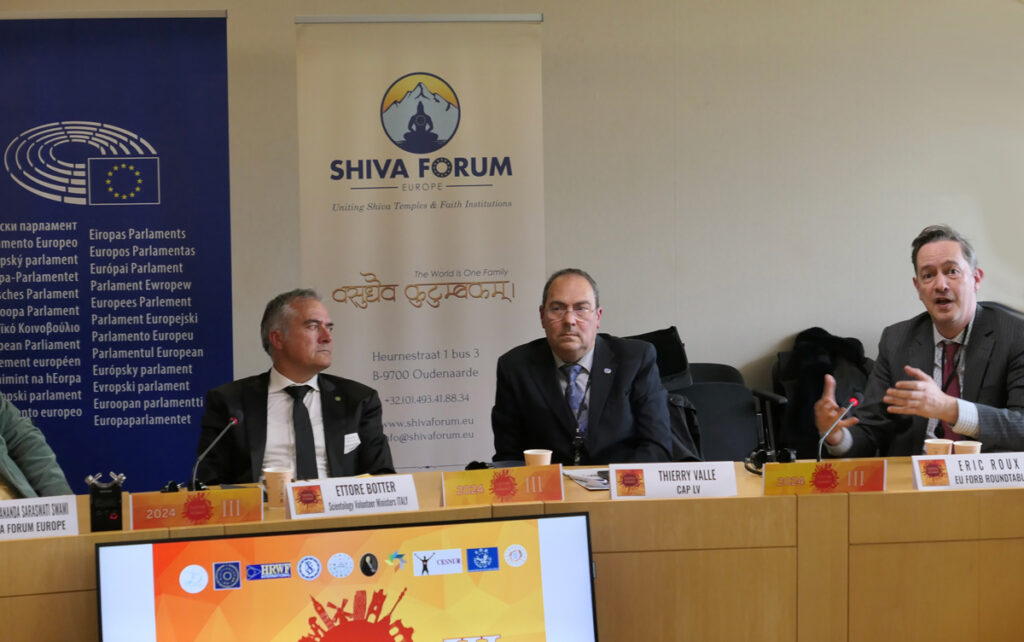
After that was the turn of Eric Roux, Member of the Executive Committee of United Religions Initiative (URI) (and Co-Chair of the EU Brussels FoRB Roundtable), who advocated for increased collaboration among faith groups through URI’s interfaith coalition.
Highlighting URI’s role as an international organization promoting interfaith cooperation and societal enhancement, Roux emphasized the importance of working together across diverse religious and spiritual traditions. Roux’s impassioned plea underscored cooperation as the key to combating religious extremism and fostering solutions to global conflicts, positioning URI as a platform to amplify the impactful work of various faith communities.
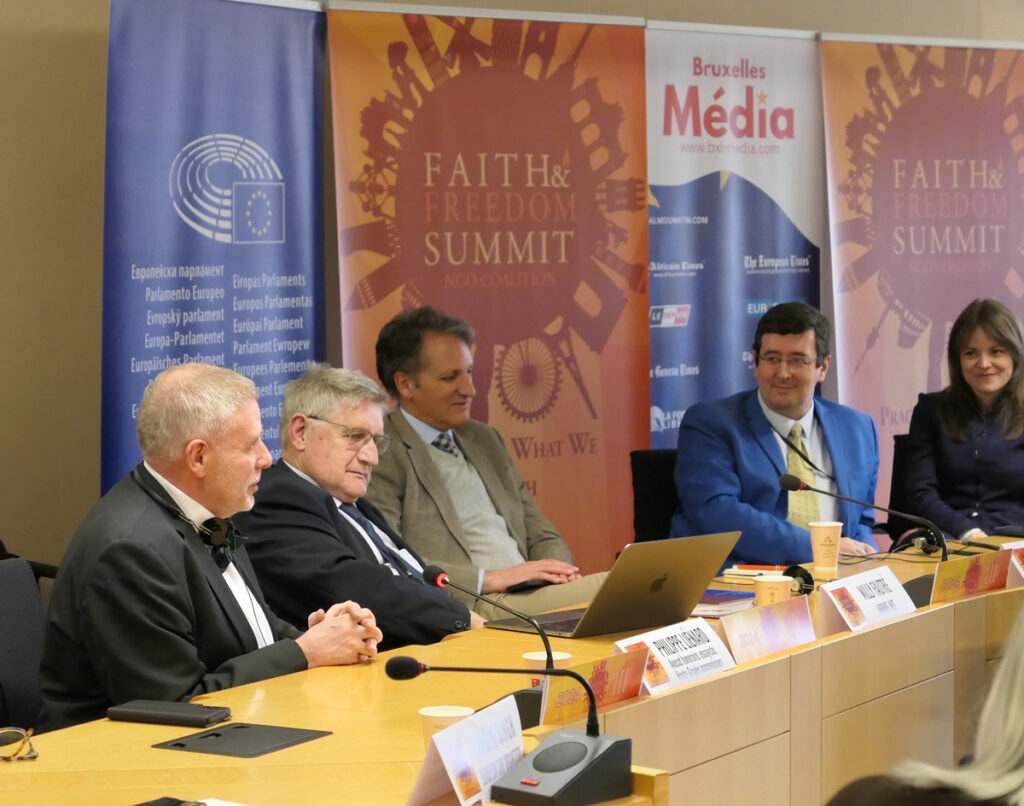
As the last speaker before the discussion and the conclusion by the host of the event, the participants listened to Dr. Philippe Liénard, a lawyer, former judge, author and prominent figure in Freemasonry at the European level, who shared insights into the centuries-old organization during his speech at the conference. Liénard expressed gratitude for the event’s organization and highlighted Freemasonry as a diverse entity, with 95% adhering to theistic beliefs under the United Grand Lodge of England and 5% embracing liberal principles allowing for varying beliefs. He emphasized Freemasonry as a platform for free thought and moral improvement, promoting virtues like wisdom and tolerance to benefit humanity. Liénard underscored Freemasonry’s core values of respect for all religions and philosophies, emphasizing the importance of honesty, freedom of thought, and good character for membership. He called for the construction of bridges between diverse communities and philosophies, aligning with Freemasonry’s ethos of openness and service to others.
Others attending the summit and expressing their views were jurist and author Marianne Bruck, Khadija Chentouf from Kaizen Life ASBL, Raiza Maduro of HWPL, Prof. Dr. Liviu Olteanu, Refka Elech of Peacefully Connected, Patricia Haveman of MundoYoUnido, and others.
MEP Maxette Pirbakas expressed gratitude to attendees from various countries at the conference, emphasizing the importance of learning from each other’s religious perspectives. Pirbakas, who identifies as both Hindu and Christian, raised concerns about the politicization of religion in the European Parliament, noting a shift towards focusing on religious and immigration issues. She called for understanding and cooperation among different faiths, highlighting the need to combat stereotypes and promote unity. Pirbakas underscored the significance of sharing experiences and organizing seminars to foster dialogue and mutual respect, advocating for a more inclusive and harmonious society. Despite facing challenges as a female politician, Pirbakas remains committed to advocating for human rights, and peaceful coexistence.
We acknowledge The European Times for the information.


